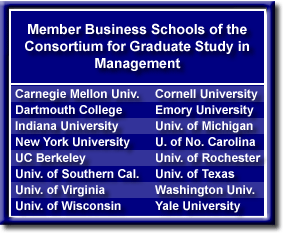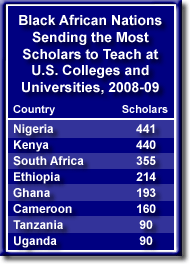One Florida Plan Fails to Keep Its Promise of Promoting Diversity in College Enrollments
 In 2000, Gov. Jeb Bush’s One Florida plan was enacted. One of the stipulations was that state universities could not consider race in admissions decisions. But high school students who finished in the top 20 percent of their graduating class would gain admission to the state university system. In 2000, Gov. Jeb Bush’s One Florida plan was enacted. One of the stipulations was that state universities could not consider race in admissions decisions. But high school students who finished in the top 20 percent of their graduating class would gain admission to the state university system.
But under the One Florida plan the percentage of blacks and other minorities in the freshman class at state universities in Florida has declined. In 1999 blacks made up 20 percent of the high school graduates in the state of Florida. That year blacks were 17.5 percent of the entering students at Florida’s state universities.
In 2008 blacks were 19.5 percent of the high school graduates in the state. But African Americans were only 14.9 percent of the entering freshmen at publicly operated universities in Florida.
In 2008 non-Hispanic whites were 54 percent of the high school graduates and 58 percent of the college freshmen.
Berkeley’s Haas School of Business Rejoins Consortium Looking to Increase Racial Diversity Among MBA Candidates
 In 2003 the Haas School of Business at the University of California at Berkeley dropped out of the Consortium for Graduate Study in Management. The consortium was formed to increase diversity in American business schools. At the time it offered full-tuition fellowships at leading business schools to African-American, Hispanic-American, and American-Indian applicants. Due to California state law, which prohibits public universities from offering any preferences based on race, the Haas School concluded that it had no choice but to end its participation in the consortium. In 2003 the Haas School of Business at the University of California at Berkeley dropped out of the Consortium for Graduate Study in Management. The consortium was formed to increase diversity in American business schools. At the time it offered full-tuition fellowships at leading business schools to African-American, Hispanic-American, and American-Indian applicants. Due to California state law, which prohibits public universities from offering any preferences based on race, the Haas School concluded that it had no choice but to end its participation in the consortium.
In 2005 the consortium changed its policy. Applicants for fellowships can now be of any race or ethnic group but they must demonstrate a commitment to advancing diversity. As a result of the policy change, the Haas School has rejoined the consortium.
The consortium is funded by corporate partners. Among the largest contributors are 3M, Johnson & Johnson, General Mills, and Bank of America.


NATIONAL INSTITUTE OF DIABETES & DIGESTIVE & KIDNEY DISEASES (NIDDK)

Senior Scientific Advisor for Women’s Urologic Health
THE POSITION: The National Institute of Diabetes and Digestive and Kidney Diseases (NIDDK) is seeking an exceptional candidate to serve as the Senior Scientific Advisor for Women’s Urologic Health. The incumbent is responsible for developing and maintaining a research program in diseases of the female bladder and urethra, and multi-system diseases in which there is prominent involvement of the urogenital system. NIDDK’s urology programs have a high impact on public health. This position will focus on research areas that include urinary incontinence, overactive bladder, chronic urologic pelvic pain syndromes (interstitial cystitis), urinary tract infection, and urinary reflux; developing a new outreach program in Women’s Urology; and developing a new Technology in Urology program. The incumbent will have primary responsibility for development of new scientific research initiative concepts. This will include: 1) strategic planning and monitoring research opportunities and assisting the Director of DKUHD in setting urologic diseases priorities, 2) development and implementation of clinical study protocols, 3) administrative oversight of compliance with established Federal rules and other clinical study policies, and 4) oversight of study budgets. The incumbent will be responsible for assuring that the multi-center clinical trials and studies supported by the Division are conducted in accordance with NIDDK and NIH policies. He/she will participate with study investigators in the design of study analyses and may participate in the presentation and publication of study results. He/she will provide guidance and mentorship to the project officers directly responsible for the trials. Research in the urologic system constitutes the second largest component of the Division’s activities, accounting for approximately $71 million in awards in FY2008.
QUALIFICATIONS REQUIRED: Applicants must possess an M.D. or equivalent degree, with sub-specialization in Urology, national recognition for research in urologic diseases, and administrative experience. In addition, experience in urologic science, clinical research and/or clinical trials (i.e., urologist, urogynecologist, urologic scientist, pathologist, or epidemiologist) is highly desirable.
SALARY/BENEFITS: Salary is commensurate with experience and a full package of Civil Service benefits is available, including: retirement, health and life insurance, long term care insurance, leave and savings plan (401K equivalent). This position is subject to a background investigation.
HOW TO APPLY: Curriculum Vitae, Bibliography, and three letters of recommendation must be received by May 14, 2010. Application packages should be sent to Ms. Janice Balin, National Institutes of Health (NIH), National Institute of Diabetes & Digestive & Kidney Diseases (NIDDK), 31 Center Drive, MSC 2560, Building 31, Room 9A-47, Bethesda, Maryland 20892. For further information, please call (301) 594-7772. All information provided by candidates will remain confidential and will not be released outside the NIDDK search process without a signed release from candidates.
DHHS and NIH are Equal Opportunity Employers

Three Finalists Named for Presidency at Southern University
 The Southern University Board of Supervisors has narrowed the field of candidates for the presidency of the university from five to three candidates. The board plans to meet with each candidate tomorrow and announce its decision. The Southern University Board of Supervisors has narrowed the field of candidates for the presidency of the university from five to three candidates. The board plans to meet with each candidate tomorrow and announce its decision.
The presidential search committee evaluated each candidate and ranked them on their accumulated score. The search committee’s top candidate is Ronald Mason Jr., the current president of Jackson State University in Mississippi. Also under consideration are Leonard Haynes III, a senior adviser in the Office of Postsecondary Education for the U.S. Department of Education, and Robert Jennings, the former president of Alabama A&M University.
University of California Seeks Stronger Prohibitions Against Acts of Racial Hate
 Over the past 15 years there have been 115 reported incidents of racial hate on the 10 campuses of the University of California. UCLA and the University of California at Davis reported the most incidents. Suspects were identified in only four of the 115 cases. Over the past 15 years there have been 115 reported incidents of racial hate on the 10 campuses of the University of California. UCLA and the University of California at Davis reported the most incidents. Suspects were identified in only four of the 115 cases.
In recent months there has been a major increase in racial incidents on University of California campuses. University president Mark Yudof stated that the recent incidents “are the worst acts of racism and intolerance I’ve seen on college campuses in 20 years.”
The current student code of conduct prohibits sexual and racial harassment but Yudof is calling for stronger language in the code against acts of racial hate. The new language he is considering would prohibit “hanging a noose, burning a cross, or placing a symbol such as a swastika on university property or at official university functions.”
Students Who Racially Integrated the University of Alabama to Be Honored at the Site of the “Stand in the Schoolhouse Door”
In June 1963, Gov. George C. Wallace made his historic “stand in the schoolhouse door” in a show of defiance against a federal court which ordered the racial integration of the University of Alabama. The Kennedy administration, represented by Assistant Attorney General Nicholas deB. Katzenbach, agreed to permit Wallace to stage his show of defiance to federal authority but only after receiving assurances from the governor that he would not pull out the state highway patrol and leave the city in the hands of racist thugs. Wallace kept his part of the bargain and Vivian Malone and James Hood were permitted to enroll at the University of Alabama.
Up to now this historical event was noted by a small plaque on Foster Auditorium where Wallace made his stand. The building was closed in 2006 due to asbestos.

Now, Foster Auditorium is undergoing a $15 million renovation that will convert the building to a gymnasium that will be home to the women’s basketball and volleyball teams. A new plaza and a clock tower will be constructed outside the building to commemorate the event, which was a major milestone of the civil rights movement. The plaza will be named after Hood and Malone. The clock tower will be named after Autherine Lucy, a black woman who unsuccessfully tried to integrate the university seven years earlier in 1956.
New Study Links Sickle Cell Disease With Learning Disabilities
Sickle cell disease can affect people of any race but it is far more common among African Americans than it is among whites. About one in every 500 African-American children is born with the sickle cell trait.
 Now a new study by the Centers for Disease Control and Prevention finds that black children who develop sickle cell disease are more likely than other black children to have intellectual disabilities, hearing impairments, and to experience severe headaches or migraines. The study, published in the American Journal of Preventive Medicine, found that black children with sickle cell disease are four times as likely as other black children to have fair or poor health status and are twice as likely as other black children to have visited a mental health professional. Now a new study by the Centers for Disease Control and Prevention finds that black children who develop sickle cell disease are more likely than other black children to have intellectual disabilities, hearing impairments, and to experience severe headaches or migraines. The study, published in the American Journal of Preventive Medicine, found that black children with sickle cell disease are four times as likely as other black children to have fair or poor health status and are twice as likely as other black children to have visited a mental health professional.
  |
1.3% Percentage of African Americans over the age of 25 in 1940 who held a four-year college degree.
19.4% Percentage of African Americans over the age of 25 in 2009 who held a four-year college degree.
source:U.S. Department of Education
|
Appointments, Promotions, and Resignations
 • Cheryl Hinton was appointed director of multicultural affairs at Stevenson University in Maryland. She was the Title III project director at Baltimore City Community College. • Cheryl Hinton was appointed director of multicultural affairs at Stevenson University in Maryland. She was the Title III project director at Baltimore City Community College.
Hinton is a graduate of Delaware State University and holds a master’s degree from Coppin State University.
 • George Gallien was named director of multicultural student affairs at Eastern Kentucky University in Richmond. Since 2001 Gallien has served as associate chaplain and director of interfaith ministry at Loyola University in New Orleans. • George Gallien was named director of multicultural student affairs at Eastern Kentucky University in Richmond. Since 2001 Gallien has served as associate chaplain and director of interfaith ministry at Loyola University in New Orleans.
Gallien is a graduate of Grambling State University and holds a master’s degree from Loyola University.
 • Gloria J. Willingham was named interim provost and senior vice president of Fielding Graduate University in Santa Barbara, California. She has been serving as associate dean for academic affairs at the university’s School of Educational Leadership and Change. • Gloria J. Willingham was named interim provost and senior vice president of Fielding Graduate University in Santa Barbara, California. She has been serving as associate dean for academic affairs at the university’s School of Educational Leadership and Change.
Dr. Willingham is a graduate of the State University of New York at Albany. She holds a master’s degree in nursing from the University of Arkansas and an educational doctorate from Claremont Graduate University.
• Jamel K. Donnor has accepted an assistant professorship in the School of Education at The College of William and Mary. Dr. Donnor is a graduate of Washington State University. He holds a master’s degree from The Ohio State University and a doctorate in curriculum and instruction from the University of Wisconsin-Madison.
 • Josephine McCann Posey was named special assistant to the president on accreditation initiatives at Alcorn State University. She had retired in September 2009 from her position as interim vice president for academic affairs at Alcorn State. Previously she served as dean of the School of Education at the university. • Josephine McCann Posey was named special assistant to the president on accreditation initiatives at Alcorn State University. She had retired in September 2009 from her position as interim vice president for academic affairs at Alcorn State. Previously she served as dean of the School of Education at the university.
A graduate of Alcorn State University, Dr. Posey earned master’s and doctoral degrees from Mississippi State University.
 • Julius Scipio was appointed interim vice president for academic affairs at Fort Valley State University in Georgia. Since 2008 he has served as associate vice president for academic affairs at the university. He previously was an administrator at Voorhees College in Denmark, South Carolina. • Julius Scipio was appointed interim vice president for academic affairs at Fort Valley State University in Georgia. Since 2008 he has served as associate vice president for academic affairs at the university. He previously was an administrator at Voorhees College in Denmark, South Carolina.
Dr. Scipio is a graduate of Paine College. He holds master’s and doctoral degrees from Memphis State University.
|
The Passing of Two Civil Rights Icons
 Dorothy Irene Height, who President Obama called the “godmother of the civil rights movement,” passed away last Tuesday at Howard University Hospital. She was 98 years old. Dorothy Irene Height, who President Obama called the “godmother of the civil rights movement,” passed away last Tuesday at Howard University Hospital. She was 98 years old.
For 40 years Height served as president of the National Council of Negro Women. In that position she lobbied presidents and lawmakers to push for equal opportunity for all Americans.
A native of Richmond, Virginia, Height was raised near Pittsburgh. She was accepted to Barnard College but was denied admission because the college had already enrolled its quota of two African Americans. She went on to earn a bachelor’s and master’s degree at New York University.
 Benjamin Hooks, the longtime leader of the NAACP, died in Memphis on April 15. Hooks chaired the NAACP from 1976 to 1992. Benjamin Hooks, the longtime leader of the NAACP, died in Memphis on April 15. Hooks chaired the NAACP from 1976 to 1992.
A graduate of Howard University and the DePaul University School of Law, Hooks was also an ordained minister.
He was the first black criminal court judge in the state of Tennessee and in 1972 became the first black member of the Federal Communications Commission.
  |
“You can’t let the other crowd out there alone, with their tea and their bags and their signs. You’ve got to get out and organize and agitate and stand up and make some noise.”
 — Attorney General Eric Holder, addressing a conference in Raleigh, North Carolina, commemorating the 50th anniversary of the founding of the Student Nonviolent Coordinating Committee — Attorney General Eric Holder, addressing a conference in Raleigh, North Carolina, commemorating the 50th anniversary of the founding of the Student Nonviolent Coordinating Committee
|
Haki Madhubuti Resigns His Post at Chicago State University
 Haki R. Madhubuti, prolific African-American author and poet, has resigned his position as Distinguished University Professor at Chicago State University. Professor Madhubuti taught at Chicago State for 26 years and founded the Gwendolyn Brooks Center for Black Literature and Creative Writing. Madhubuti is also the founder and chair of Third World Press. Haki R. Madhubuti, prolific African-American author and poet, has resigned his position as Distinguished University Professor at Chicago State University. Professor Madhubuti taught at Chicago State for 26 years and founded the Gwendolyn Brooks Center for Black Literature and Creative Writing. Madhubuti is also the founder and chair of Third World Press.
In a statement, Madhubuti said that he resigned because of a dispute with university president Wayne Watson. Last year, Professor Madhubuti opposed Watson’s appointment as president of the university. Madhubuti claims he was demoted in retribution for his opposition to Watson. He was removed from the paid staff of the Gwendolyn Brooks Center, had his teaching load increased, and was demoted to volunteer status at the master’s program in creative writing that he had founded at Chicago State. In the statement, Madhubuti said, “I am convinced that this move against me is personal and vindictive.”
Study Finds That African-American Students Who Work on Campus Do Better Academically Than Their Peers
A new study finds that African-American college students who work while enrolled tend to do better academically. The study is published in a new book, Understanding the Working College Student: New Research and Its Implications for Policy and Practice by Lamont A. Flowers of Clemson University.
 Dr. Flowers found that black students who had full-time jobs off campus were more likely to earn As in their coursework than students who worked part-time or did not work at all. Students with campus jobs did better academically than those who worked off campus but off-campus workers were academically more successful than black students who did not work. Professor Flowers concludes that “working on campus provides African-American students with another opportunity, beyond the classroom, to engage their institutional environments in meaningful ways.” Dr. Flowers found that black students who had full-time jobs off campus were more likely to earn As in their coursework than students who worked part-time or did not work at all. Students with campus jobs did better academically than those who worked off campus but off-campus workers were academically more successful than black students who did not work. Professor Flowers concludes that “working on campus provides African-American students with another opportunity, beyond the classroom, to engage their institutional environments in meaningful ways.”
Dr. Flowers is Distinguished Professor of Educational Leadership at the Eugene T. Moore School of Education and executive director of the Charles H. Houston Center for the Study of the Black Experience in Education at Clemson University. He is a graduate of Virginia Commonwealth University and holds master’s and doctoral degrees in education from the University of Iowa.
Black African Nations Sending the Most Scholars to Teach at U.S. Colleges and Universities
 According to data from the Institute of International Education, scholars from 43 black African nations taught at U.S. colleges and universities during the 2008-09 academic year. Nigeria sent 441 scholars to teach in the U.S., more than any other black African nation. Kenya was a close second with 440. South Africa sent 355 scholars to teach at U.S. universities. But it is not known how many of these South African scholars teaching in the U.S. are white and how many are black. According to data from the Institute of International Education, scholars from 43 black African nations taught at U.S. colleges and universities during the 2008-09 academic year. Nigeria sent 441 scholars to teach in the U.S., more than any other black African nation. Kenya was a close second with 440. South Africa sent 355 scholars to teach at U.S. universities. But it is not known how many of these South African scholars teaching in the U.S. are white and how many are black.
Among other black African nations, Ghana, Ethiopia, and Cameroon were the only other black African nations to send as many as 100 scholars to teach at U.S. universities. Eight other black African nations sent at least 50 black scholars to the U.S.
Historically Black Claflin University Aims to Become a Science Powerhouse
 Recently a new $5 million, 14,000-square-foot molecular science research center opened its doors on the campus of Claflin University, a historically black educational institution in Orangeburg. The new center is being showcased to recruit black students and research faculty to the university. The center is currently conducting research for the Department of Defense to develop a procedure for decontaminating mustard gas. Recently a new $5 million, 14,000-square-foot molecular science research center opened its doors on the campus of Claflin University, a historically black educational institution in Orangeburg. The new center is being showcased to recruit black students and research faculty to the university. The center is currently conducting research for the Department of Defense to develop a procedure for decontaminating mustard gas.
Since 2000 the number of biology department faculty at the university has increased fourfold from five to 20. The university currently graduates more black students in the hard sciences than Clemson University.
Claflin offers a nurturing environment for its students majoring in science disciplines. Students intending to major in the sciences at Claflin are encouraged to attend a summer bridge program after they graduate from high school where they would study with mentors in courses such as calculus and chemistry. In the fall, students in the sciences who receive below a grade of C are required to attend supplemental education classes three nights a week.

UNIVERSITY OF TORONTO
SCARBOROUGH

Dean of Student Affairs
University of Toronto Scarborough (UTSC) seeks a new Dean of Student Affairs who will work closely with other administrators and academic leaders to integrate Student Affairs leadership into the highest levels of planning and strategy and to foster an environment that enriches the student environment at UTSC.
The Dean of Student Affairs is responsible for student services departments, including: Academic Advising & Career Centre, Health & Wellness Centre, AccessAbility Services, Athletics & Recreation, Student Life, Student Housing & Residence Life and the International Student Centre.
Candidate Qualifications
The Dean of Student Affairs will serve as an inspirational leader with successful experience in student affairs administration, working with diverse student populations and ensuring effective governance and leadership with student groups. The candidate will have proven organizational skills and deep knowledge of, and experience dealing with the issues and challenges facing student affairs portfolios in universities. The ideal candidate will possess successful experience in senior administrative roles, budgetary planning, managing change, and serving on university-wide committees. The University of Toronto Scarborough is proud of its diversity, and the Dean of Student Affairs will nurture this distinctive quality of the UTSC campus.
The Search Process
The University of Toronto has a long-standing tradition of modeling the principles of equity and diversity throughout the institution. The University of Toronto Scarborough especially welcomes applications from visible minority group members, women, Aboriginal persons, persons with disabilities, members of sexual minority groups, and others who may contribute to the further diversification of ideas.
Consideration of candidates will begin in May, 2010, and the new Dean of Student Affairs is expected to begin in the summer, 2010.
All inquiries, applications and nominations regarding this position will be treated in strict confidence.
Please submit your application online here.

New For-Profit Higher Education Company Will Target African-American Students
African Americans make up a larger percentage of students enrolled at for-profit institutions of higher education than is the case at not-for-profit institutions. For example, African Americans make up 30 percent of the more than 400,000 students enrolled at the 200 University of Phoenix campuses nationwide.
 Now there is a new for-profit higher education enterprise that will be geared specifically to African-American students. Latimer Education will tailor its curriculum to appeal to black students, but students of all races will be eligible to enroll. The company is based in Washington, D.C., but it is expected that most of the courses will be offered online. The company’s mission statement declares that its goal is “to improve educational outcomes and expand career opportunities for African-American students by utilizing world-class, on-line instructional tools delivered by professionals dedicated to student achievement.” Now there is a new for-profit higher education enterprise that will be geared specifically to African-American students. Latimer Education will tailor its curriculum to appeal to black students, but students of all races will be eligible to enroll. The company is based in Washington, D.C., but it is expected that most of the courses will be offered online. The company’s mission statement declares that its goal is “to improve educational outcomes and expand career opportunities for African-American students by utilizing world-class, on-line instructional tools delivered by professionals dedicated to student achievement.”
Latimer Education is led by Scott R. Royster, the former chief financial officer of the Radio One network.
The new venture is being financed in part by a cash infusion from Maveron LLC, a leading venture capital firm.
In Memoriam
Joseph D. Warren (1938-2010)
Joseph D. Warren, political associate of former Democratic presidential candidate Michael Dukakis and longtime faculty member at Northeastern University in Boston, died late last month from complications of a stroke. He was 71 years old.
Warren was a native of Harlem. He graduated from North Carolina A&T State University and held master’s and doctoral degrees from Brandeis University.
Dr. Warren served as the assistant secretary for education in Massachusetts from 1975 to 1979. He joined the Northeastern University faculty in 1982 and also served as director of community affairs and special assistant to the vice president for government relations. Before suffering a stroke in early March he was teaching a course on the economic status of ethnic minorities.
Warren’s son, Setti, is now mayor of Newton, Massachusetts.
Charlotte Anna Hanley Scott (1925-2010)
Charlotte H. Scott, professor emerita of commerce and education at the University of Virginia, has died in Charlottesville at the age of 84.
A native of Yonkers, New York, in 1947 she graduated from Barnard College. She later earned an MBA from the University of Chicago. In 1971 Scott was the first African-American woman to be named a vice president of the Federal Reserve Bank of Chicago.
In 1976 Charlotte Scott and her husband Nathan Scott both accepted tenured faculty positions at the University of Virginia. Her husband, now deceased, retired in 1990 as the William R. Kenan Professor of Religious Studies. Charlotte Scott retired from teaching in 1998.
Honors and Awards
 • Kevin Young, Atticus Haygood Professor of English and Creative Writing and curator of literary collections at the Raymond Danowski Poetry Library at Emory University in Atlanta, received the Graywolf Press Nonfiction Prize. The award is given to an emerging author who has published no more than two works of nonfiction. • Kevin Young, Atticus Haygood Professor of English and Creative Writing and curator of literary collections at the Raymond Danowski Poetry Library at Emory University in Atlanta, received the Graywolf Press Nonfiction Prize. The award is given to an emerging author who has published no more than two works of nonfiction.
 • Cynthia Nance, dean and professor at the University of Arkansas School of Law, was named a Woman of Influence at Arkansas Business. Nance has been dean of the law school since 2006. She is the first woman and first African American to hold the position. • Cynthia Nance, dean and professor at the University of Arkansas School of Law, was named a Woman of Influence at Arkansas Business. Nance has been dean of the law school since 2006. She is the first woman and first African American to hold the position.
 • LaTisha Smith, dean of teacher education at Harris-Stowe State University in St. Louis, received the Woman of Distinction Award from the Professional Organization of Women. A graduate of the University of Missouri, she holds an educational doctorate from Nova Southeastern University. • LaTisha Smith, dean of teacher education at Harris-Stowe State University in St. Louis, received the Woman of Distinction Award from the Professional Organization of Women. A graduate of the University of Missouri, she holds an educational doctorate from Nova Southeastern University.
• The Department of Computational and Applied Mathematics at Rice University received the 2010 Mathematics Programs That Make a Difference Award from the American Mathematical Society. The award is given to programs that have been successful in bringing members of underrepresented minority groups into the field of mathematical sciences. Thirty-four minority students have earned Ph.D.s in mathematics at Rice over the past quarter-century.
Grants and Gifts
• The University of Louisville received a two-year, $600,000 grant from the Robert Wood Johnson Foundation for a summer program to interest rural, poor, and minority students in careers in dentistry and medicine.
• Delaware State University, the historically black educational institution in Dover, received a $100,000 grant from the National Science Foundation. The grant will fund a scholarship program for students in science, technology, and mathematics. |
 .
.